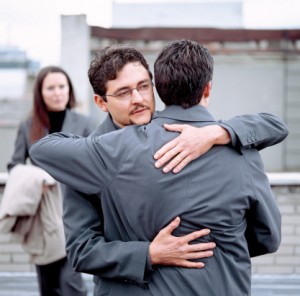 Most breakups are painful—not just for the couple, but also for those standing in the surrounding blast zone. We often hear about how divorce can affect the immediate family, but we rarely think about how a breakup or divorce affects a couple’s friends.
Most breakups are painful—not just for the couple, but also for those standing in the surrounding blast zone. We often hear about how divorce can affect the immediate family, but we rarely think about how a breakup or divorce affects a couple’s friends.
Studies have shown that divorce often negatively impacts those with up to two degrees of separation from the couple. If you’re friends with a recently divorced or broken-up pair, it is likely that your life may be impacted in one of the following ways.
1. You’re More Likely to Get Divorced
You wouldn’t necessarily think that someone else’s divorce could affect your marriage, but some studies show it can.
Divorce contagion is a social phenomenon wherein certain behaviors, feelings, and attitudes spread throughout a social network. This occurs because people tend to become more open to ideas and behaviors when they’re supported by their peers. When a married person talks with a divorced friend, he or she directly or indirectly learns the benefits and drawbacks of separation and may become more accustomed to or interested in the idea. If your significant other has been on the fence about the viability of your relationship, a divorce within your social circle can become a tipping point.
According to prominent research, if your friend gets divorced, your marriage has a 147% greater chance of coming to an end. Even your coworker’s divorce could affect your life, increasing your probability for divorce by 55%. According to the same research, however, if you have children your marriage will likely remain unaffected by the divorce of a friend. Children have been found to counter the effects of the social divorce contagion. Research reveals that couples with children are not as susceptible and their marriages are likely to stay intact regardless of the outcome of friends’ marriages.
2. Couple Friendships May Dissolve
If you’re married or in a long-term relationship and both you and your partner are friends with parting couples, it is quite possible that many or all of the shared friendships will dissolve. The double dates to movies, dinners, and sporting events will end immediately, but it may even be difficult to remain friends with an individual within a shared friendship.
Newly single people tend to dislike spending time with couples if it reminds them of an ended marriage or relationship that didn’t pan out. Similarly, couples may feel uneasy about spending time with a newly divorced friend if they were once friends with both partners. They may feel pressured to choose sides or reveal information to one party about the other.
In one study examining the fallout effect of ended relationships, for 50% of recently split couples, the former partners also ended friendships with one or more members of another couple with whom the former partners had been friends. One in eight couples ended their friendships with both partners in a mutual friendship. Don’t be too discouraged by these findings, however. It is quite possible to maintain your friendships after a relationship has ended. In fact, about 33% of the couples in the same study reported that they were able to remain friends with both of the individuals in a shared friendship.
3. Group Outings and Events May Never Be the Same
As mentioned earlier, if a couple in your social circle splits, your group of friends could end up losing one or both individuals from the recently parted couple. If your group is able to maintain the friendships, however, there will probably still be some difficulties when planning events such as birthday parties, group dinners, or other events that bring everyone together. One partner may not wish to see the other, forcing the group to choose when making invitations. One or both members of the former couple may choose not to come to a group event out of fear of seeing the other, or they could both come and end up arguing or making the event awkward for others in attendance.
It should be stressed that this isn’t always the case. Many couples are able to maintain healthy friendships and treat each other with kindness and respect. Regardless, your group of friends will notice some changes when it comes to getting the gang together.
4. Remaining Neutral Could Be Difficult
Most people who are mutual friends with both members of a divorced or split couple will choose to remain neutral and maintain friendships with both parties. Unfortunately, this isn’t always easy. Many people feel pressured to choose between friends, and they may not know how they should act around their newly divorced pals.
For this reason, people may start to distance themselves and friendships could weaken. As a mutual friend of the couple, expect to experience some uncomfortable feelings in the months following the breakup.
Help Your Friends Reach Out for Help If They Need It
Ending a relationship or filing for divorce is tough on all involved parties, including a couple’s friends. In the days, weeks, and months following a breakup or divorce, people generally reach out to friends for support, confirmation that they did the right thing, and a shoulder to lean or cry on. Be a good friend and be aware of some of the changes within your friend’s life.
If your friend has recently ended a relationship, know that some things are going to change, especially if he or she (or they) belonged to a larger social circle that you’re a part of. Be sensitive to these changes and try to help your friend get through them. If you notice he or she is exhibiting symptoms of depression or experiencing an unusual amount of stress and anxiety, please consider helping your friend find a qualified therapist to speak with. A therapist can provide a safe, neutral space, free of judgment, to help a person understand his or her feelings and behaviors related to the ended relationship, and the shifting dynamics that will inevitably occur after the split.
References:
- Chen, Stephanie. (June 10, 2010). Could you be ‘infected’ by friend’s divorce? Retrieved from http://www.cnn.com/2010/LIVING/06/10/divorce.contagious.gore/
- Deal, Katherine H., and Grief, Geoffrey. (August 31, 2012). The impact of divorce on friendships with couples and individuals. Journal of Divorce and Remarriage. Vol 53, Issue 6. DOI: 10.1080/10502556.2012.682894
- Morin, Rich. (October 21, 2013). Is divorce contagious? Pew Research Center. Retrieved from http://www.pewresearch.org/fact-tank/2013/10/21/is-divorce-contagious/
- Moutria, Kristen. The Effect of Divorces on Mutual Friendships. Global Post. Retrieved from http://everydaylife.globalpost.com/effects-divorces-mutual-friendships-14139.html

The preceding article was solely written by the author named above. Any views and opinions expressed are not necessarily shared by GoodTherapy.org. Questions or concerns about the preceding article can be directed to the author or posted as a comment below.

 Divorce Without Remorse: When Your Ex Won't Apologize
Divorce Without Remorse: When Your Ex Won't Apologize 5 Steps to Getting Over a Breakup
5 Steps to Getting Over a Breakup Break Up and Smell the Coffee: How to Know to Stay or Go
Break Up and Smell the Coffee: How to Know to Stay or Go

Please fill out all required fields to submit your message.
Invalid Email Address.
Please confirm that you are human.
Leave a Comment
By commenting you acknowledge acceptance of GoodTherapy.org's Terms and Conditions of Use.